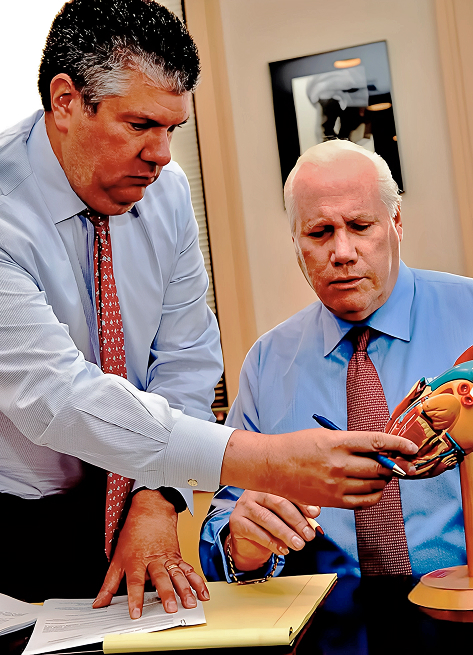Each year, traumatic brain injuries (TBIs) disrupt the lives of thousands of New Yorkers, leaving behind challenges that touch every corner of their world—physical, emotional, and financial.
For many, the journey to reclaim stability and pursue rightful compensation feels like driving around a new town without GPS.
If your injury occurred because of someone else’s negligence, it’s essential to have the right legal guidance. A New York TBI Lawyer can help you pursue the compensation you deserve while you focus on recovering.
Schedule a Free Case Evaluation
New York TBI Guide:
- Compensation in New York TBI Cases
- What to Do in the Days After the Incident
- Battling Brain Injury Issues in the City That Never Sleeps
- Employment Challenges After a Traumatic Brain Injury
- Legal Protections for Workers in New York
- How a New York TBI Lawyer Helps
- State-Level Protections from the New York State Human Rights Law
- Take the Next Step with a Trusted Legal Advocate
Why Choose Queller Fisher as Your New York TBI Lawyer

When you work with Queller Fisher, you’re putting your trust in a seasoned team of personal injury attorneys who have consistently delivered for their clients.
Here’s why we stand out:
- Proven results: With over $1 billion recovered for injury victims, we know how to secure the compensation our clients are entitled to.
- Experienced trial lawyers: Many law firms settle quickly; we prepare each case as though it’s going to trial, so insurers take your claim seriously.
- Accessible and compassionate: We treat clients like family, giving them personalized attention and advocating for their interests at every step.
- Local knowledge: For over 60 years, we’ve fought for New Yorkers in and out of the courtroom. We know the city, its laws, and its courts well.
- No fees unless we win: There are no upfront charges. If we don’t win your case, you don’t pay us a dime.
Compensation in New York TBI Cases
One of the biggest concerns after a traumatic brain injury is affording medical care, especially when you’re unable to work. TBI survivors often face long-term expenses that the responsible party should cover.
Compensation in New York TBI cases can include both economic and non-economic damages.
Here’s what this could mean for you:
- Medical costs: This covers everything from emergency treatment and hospital stays to physical therapy, rehabilitation, and ongoing medical care.
- Lost income and reduced earning capacity: If your injury has kept you from working, you may recover not only lost wages but also compensation for future losses if you can’t return to your previous job.
- Pain and suffering: TBIs can disrupt your quality of life. Compensation for pain, emotional distress, and loss of enjoyment recognizes those challenges.
- Caregiver support: If you require at-home care or assistance with daily activities, these expenses may also be included in your settlement or award.
Our attorneys meticulously calculate compensation for every client. By carefully documenting your expenses and medical needs, we fight to ensure no costs are overlooked.
What to Do in the Days After the Incident

The days and weeks following a TBI are overwhelming, not just for the victim but for their loved ones. While immediate medical care is critical, there are steps you should take in the short term to protect your health and legal rights.
- Follow all medical advice
Even if you feel your symptoms are improving, strictly adhere to your doctor’s recommendations. TBIs can worsen or cause complications if not properly monitored. - Document your symptoms and experiences
Keeping a daily log of any physical pain, cognitive difficulties, or emotional distress can provide valuable evidence for your case. - Preserve evidence from the incident
This includes photographs of the accident scene, damaged property, or any visible injuries. Holding on to items like medical records and police reports can also strengthen your case. - Avoid speaking to insurance companies alone
Insurance adjusters often contact victims quickly after an accident, asking for recorded statements and even pressuring you to accept a settlement. Consult an attorney before talking with any insurer to avoid jeopardizing your claim. - Call a trusted TBI lawyer
Having an attorney who understands traumatic brain injuries on your side ensures that your case is handled properly from the start.
Battling Brain Injury Issues in the City That Never Sleeps
New York City is dynamic and fast-paced, but it’s also home to countless hazards that can cause traumatic brain injuries.
It doesn’t matter if your TBI occurred during a construction accident in Manhattan, a car crash on a White Plains expressway, or a slip-and-fall at a Brooklyn business; one thing is clear: life in New York makes fair resolutions in injury cases even more important.
At Queller Fisher, we bring decades of local experience to your corner, easing the burden of handling the legal aftermath all alone.
Insurance companies work hard to protect their bottom line. When dealing with a traumatic brain injury, you can expect pushback on claims, delays, and even attempts to minimize or deny the severity of your injury.
Pursuing fair compensation is rarely simple.
Here’s what you should know about how insurers operate after an accident:
- Early contact to lowball victims
Insurers frequently contact victims soon after an incident, when they’re most vulnerable, to offer settlements far below what’s fair. - Denials stemming from “lack of evidence”
If you don’t have airtight documentation or if there are gaps in your medical care, insurers might argue your injury wasn’t severe or wasn’t connected to the accident. - Prolonged negotiations
Many companies drag out negotiations, hoping you’ll settle out of frustration before the full extent of your damages can be calculated.
You don’t have to face this process alone. Queller Fisher’s attorneys know all the strategies insurance companies use. We don’t just negotiate for better settlements—we use our courtroom experience to hold them accountable if they refuse to offer what you’re owed. With us in your corner, the playing field is even, and your voice is heard.
Employment Challenges After a Traumatic Brain Injury

Traumatic brain injuries often make it hard for victims to return to work or find new employment, creating a ripple effect on their financial and emotional well-being.
While some individuals might recover enough to resume their previous roles, others face long-term or permanent changes that reshape their career paths. For many, the process brings unexpected hurdles that are both frustrating and exhausting.
Barriers to Returning to Work
A TBI can affect a person’s ability to work in different ways, depending on the severity and location of the injury.
Some common barriers include:
- Cognitive challenges: Memory loss, difficulty concentrating, and slower processing skills can make once-routine tasks feel impossible. Even desk jobs or roles that require minimal physical activity may become hard to manage.
- Physical limitations: For those with mobility issues or chronic fatigue resulting from their injury, working a full day or commuting on crowded New York subways can feel insurmountable.
- Emotional and behavioral changes: TBIs often bring mood swings, anxiety, depression, or trouble with impulse control, making workplace interactions and relationships more challenging.
- Loss of required skills: If a specific job demands particular skills or certifications that can no longer be maintained post-injury, finding alternative employment may complicate matters further.
Legal Protections for Workers in New York
New York law, along with federal regulations like the Americans with Disabilities Act (ADA), provides legal protections to individuals with TBIs to help them stay in or re-enter the workforce.
These include the right to reasonable accommodations, which could involve:
- Adjusting work hours or creating a flexible schedule.
- Modifying a workspace, such as adding ergonomic furniture or assistive devices.
- Changing certain job responsibilities to accommodate physical or mental limitations.
- Offering retraining or additional job support to help individuals adapt to a new way of working.
Employers are required to interact with employees to identify feasible accommodations. However, not all employers are willing to cooperate; some may even discriminate against individuals with TBIs. This is where having legal guidance becomes essential.
How a New York TBI Lawyer Helps

Navigating employment challenges often requires more than adjustments at work. A skilled attorney can uphold your legal rights and help you secure what you’re entitled to under the law.
At Queller Fisher, we assist clients in several ways:
- Advocating for workplace accommodations: If your employer is reluctant to make accommodations or is treating you unfairly, we can take action to protect your rights.
- Calculating lost earning potential: If your ability to work is permanently affected, we help determine the value of lost wages and diminished earning capacity as part of your compensation.
- Seeking justice in workplace discrimination cases: If you’ve faced unfair treatment because of your injury, we stand by your side to hold your employer accountable.
No one should have to choose between their health and their job. By leaning on legal support, you can focus on recovery while your attorney tackles the complexities of employment protections and compensation claims.
Queller Fisher ensures you don’t face those obstacles without the necessary resources to succeed.
State-Level Protections from the New York State Human Rights Law
New Yorkers enjoy additional workplace protections under the New York State Human Rights Law (NYSHRL). This law expands on the ADA by requiring accommodations from employers with as few as four employees.
Its flexibility protects workers across a wider range of businesses, which is especially important in small and medium-sized workplaces throughout the city.
Like the ADA, the NYSHRL requires employers to provide reasonable accommodations to employees with disabilities.
The state law also offers broader protections against discrimination and harassment, prohibiting any acts of retaliation when an employee seeks accommodations or reports unfair treatment due to their injury.
Protections against workplace discrimination
Both the ADA and NYSHRL also protect employees from discrimination based on their traumatic brain injury.
Employers cannot:
- Terminate employment solely because of a disability.
- Deny promotions, pay raises, or training because of limitations linked to a TBI.
- Subject employees with disabilities to workplace harassment or create a hostile work environment.
Additionally, any retaliation against an employee who requests accommodations or files a discrimination complaint is strictly prohibited. Unfortunately, these protections often go ignored, leaving workers vulnerable to unfair treatment.
How a TBI Lawyer Can Enforce Your Rights
While federal and state laws provide a strong framework for worker protections, asserting these rights is not always straightforward. Many employers may try to downplay their obligations, reject reasonable accommodation requests without basis, or create work environments that pressure employees into leaving.
This is where a skilled TBI lawyer can step in. When an experienced legal advocate represents you, you’re better equipped to protect your rights.
Here’s how they can help:
- Reviewing accommodations requests to ensure they meet legal standards for fairness and reasonableness.
- Communicating with employers to hold them accountable for their responsibilities under the law.
- Filing claims for discrimination if your rights are denied, including pursuing damages for lost wages, emotional distress, or wrongful termination.
- Ensuring compliance with both state and federal laws, so your employer can’t use ignorance or vague policies to sidestep their obligations.
Practical Support for Long-Term Success

Beyond fighting for your legal rights, a compassionate TBI lawyer makes life easier during a time of personal upheaval. By focusing on the legal complexities, they allow you to concentrate on recovery while ensuring your needs are respected in the workplace.
Their guidance ensures you won’t feel pressured into returning to unsafe conditions or settling for less than the law guarantees.
If your employer isn’t cooperating with legal accommodations or you suspect discrimination has impacted your career after a TBI, seeking legal support is one of the most important steps you can take.
At Queller Fisher, we protect workers’ rights and ensure that every client receives the fair treatment, respect, and compensation they deserve.
Take the Next Step with a Trusted Legal Advocate
The legal maze following a traumatic brain injury is frustrating, and trying to handle it on your own might mean settling for far less than you deserve. The New York personal injury attorneys at Queller Fisher are ready to be your advocates, focusing on your recovery and financial security.
Call Queller Fisher today at 212.406.1700 or 718.892.0400. Don’t wait to secure the compensation you’re entitled to. Turning to our team means getting reliable support when it matters most.
Schedule a Free Case Evaluation